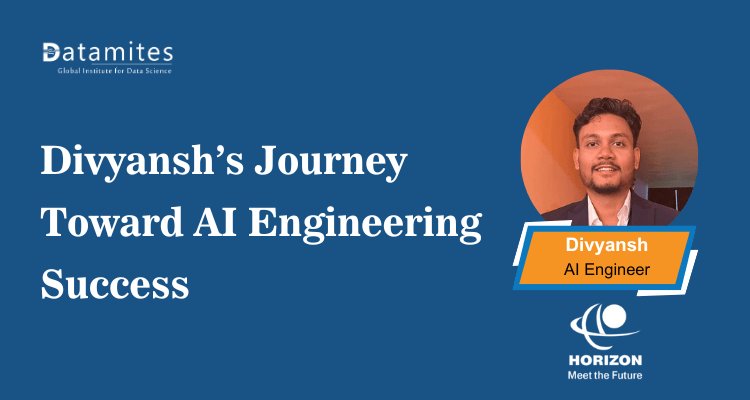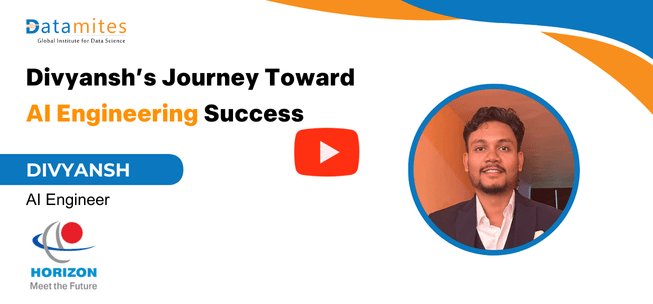From Mechanical Engineer to AI Engineer: An Inspiring Journey of Divyansh
Discover how Divyansh transitioned from a Mechanical Engineer to a successful AI Engineer. His inspiring journey highlights challenges, learning strategies, and tips for aspiring professionals in the field of Artificial Intelligence.

In a world where technology evolves at lightning speed, career transitions are no longer a distant dream, they're a bold reality. Meet Divyansh, a mechanical engineering graduate from Pune, whose curiosity and determination transformed him from a traditional engineer into a skilled AI and data science professional. What sparked this transformation? How did he navigate the challenges of learning complex algorithms, Python programming, and machine learning pipelines? In this inspiring journey, we uncover the practical strategies, real-world experiences, and key lessons that helped Divyansh carve a successful path in the competitive world of AI. Whether you’re a fresh graduate or a professional looking to switch careers, his story is a roadmap for turning passion into expertise.
Insights and Tips from Divyansh’s Journey: A Q&A Chronicle
In this Q&A, Divyansh shares practical tips, strategies, and lessons learned to guide aspiring data scientists on their own career paths.
Q1: Could you introduce yourself and share your academic and professional background?
My name is Divyansh, and I am from Pune, Maharashtra. I completed my B.Tech in Mechanical Engineering in 2022 from the Maharashtra Institute of Technology, Pune. After graduation, I started working as a ROR developer in a Pune-based company. During that time, my interest slowly shifted toward data science and machine learning. This motivated me to explore the field further, eventually leading me to structured learning and professional opportunities.
Q2: What sparked your interest in data science?
While working as a developer, I collaborated with the marketing and data analytics team. I observed how they were predicting sales and analyzing data patterns, which fascinated me. I wanted to know how they could predict trends with accuracy. The real turning point came in early 2023, when ChatGPT was introduced. Initially, I didn’t know about it, but once I explored it, I realized its potential in coding and AI-driven problem-solving. That curiosity drove me deeper into AI, machine learning, and data science.
Q3: How was your learning journey in data science?
I formally started learning data science in December 2023. Since I already had experience in coding with Python and C++, the programming aspect wasn’t very challenging. However, I realized that data science isn’t just about coding, it involves understanding algorithms, mathematical foundations, and model tuning.
Q4: What challenges did you face while learning data science, and how did you overcome them?
The toughest part was the theoretical and mathematical aspects of algorithms. Unlike simple coding tasks, data science requires an analytical mindset to understand how parameters and models behave.
I overcame this by:
- Breaking down concepts into small notes with equations and explanations.
- Practicing Python regularly to make coding more efficient.
- Exploring real-world case studies to connect theory with practice.
- It felt like climbing a ladder starting from data wrangling and visualization, moving to algorithms, and finally tackling deep learning.
Q5: What makes your learning approach different from others?
- I believe the difference lies in my curiosity and consistency. But more importantly, I also learned from my mistakes.
- Initially, I wasted almost 2–3 months without making notes. Later, I realized note-making helps in faster revision.
- I focused heavily on Python and SQL, as they are the backbone of most data science interviews.
- Instead of just reading theory, I practiced 300–400 coding problems across platforms like LeetCode, HackerRank, GeeksforGeeks, and CodeWars.
Q6: What was your experience during internships and placement?
I completed my training in August 2024. During the placement phase:
- I gave multiple interviews, both through the institute and on my own.
- Out of 5–9 interviews, only 2 were through the training institute; the rest were self-applied opportunities.
- Competition was high, so consistent preparation in Python, SQL, and machine learning concepts was crucial.
Q7: How does one handle technical tasks during interviews?
Some companies give multi-stage technical assessments:
- Example: I had a company that asked me to complete 55 tasks. The first was building a machine learning pipeline where I had to implement and tune different algorithms.
- Subsequent tasks included Python scripting (like finding the longest word in a game module) and exploratory data analysis (EDA) on datasets like Netflix data.
- All tasks required well-documented code with proper comments explaining functions and parameters.
- Even as someone from a non-technical background, careful preparation and understanding of Python and machine learning concepts helped me succeed.
Q8: What are your tips for preparing for interviews?
There are a few critical strategies:
- Develop Interest in Data Science: Without genuine interest, it’s easy to get demotivated during long preparation phases.
- Peer Learning: Teach concepts to 2–3 peers. Explaining topics reinforces your own understanding.
- Make Notes: I maintained 4 registers for Python, Data Science, SQL, and Deep Learning. This allowed me to revise concepts in 30–60 minutes before interviews.
- Consistent Practice: Regular practice with Python coding, machine learning, and SQL is essential.
Q9: How many interviews did you attend, and how was the experience?
- I attended 5–9 interviews. Some were through the placement team, while most were self-applied.
- The interviews ranged from 20-minute technical rounds to detailed assessments of past work and project experience.
- Certain companies prefer candidates from a technical background, but with proper preparation, even non-technical candidates can succeed.
Q10: How should learners approach self-effort along with placement support?
Placement teams provide opportunities, but your effort is equally important:
- Research companies independently.
- Connect with industry professionals and send personalized messages.
- Prepare thoroughly for technical and HR rounds.
- Self-driven efforts not only increase the number of interviews but also help in performing better during the process.
Q11: What message do you have for aspiring data scientists?
Success in data science is a combination of passion, practice, and preparation:
- Develop genuine interest and curiosity.
- Revise regularly using notes.
- Teach peers to reinforce learning.
- Focus on building practical skills in Python, SQL, and machine learning.
- Combine placement support with independent job search to fast-track your career.
- With persistence and structured preparation, anyone can achieve success in this competitive field.
Refer these below articles:
- Mughendhar’s Journey from Mechanical Engineering to AI Professional
- From Fresher to AI Engineer – Darshan’s Success Story
- Junaid’s Path to MLOps Excellence: Data Meets Deployment
Key Findings from Divyansh’s Data Science Journey
These key findings highlight the strategies, tools, and practices that fueled his success in the competitive field of data science and AI.
Background & Transition:
- Divyansh completed a B.Tech in Mechanical Engineering and initially worked as a ROR developer.
- His interest in data science grew while collaborating with analytics teams, leading to a career transition.
Motivation:
- Exposure to predictive analytics and data-driven decision-making sparked his interest.
- The introduction of ChatGPT in early 2023 further motivated him to explore AI and machine learning.
Learning Journey:
- Started formal learning in December 2023.
- Existing programming experience in Python and C++ helped ease the coding aspect.
- Emphasized that data science requires strong understanding of algorithms, mathematics, and model tuning.
Challenges & Overcoming Them:
- Mathematical and theoretical concepts were initially challenging.
- Breaking down concepts into notes.
- Practicing Python regularly.
- Exploring real-world case studies for practical understanding.
Learning Approach:
- Curiosity, consistency, and learning from mistakes were key differentiators.
- Developed a habit of note-making for faster revision.
- Focused heavily on Python and SQL.
- Practiced 300–400 coding problems on platforms like LeetCode, HackerRank, and GeeksforGeeks.
Read these below articles:
- Why Artificial Intelligence Matters More Than Ever
- How to Choose the Best Institute for AI/ML in Mumbai?
- How Artificial Intelligence is Transforming Digital Marketing
Divyansh’s journey is an inspiring example of how curiosity and consistent learning can transform careers. Starting as a mechanical engineer, shifting to development, and finally excelling in data science and AI, his story highlights the importance of adaptability in today’s world.
Artificial Intelligence is revolutionizing industries, and Chennai is emerging as a prominent center for AI innovation. Whether you are a student looking to dive into AI, a tech enthusiast, or a professional seeking to upgrade your skills, now is the perfect time to enter the AI field. Choosing the right artificial intelligence institute in chennai can open up exciting career opportunities and provide you with the expertise and tools needed to thrive in a data-driven world.
DataMites is a premier training institute offering specialized programs in Artificial Intelligence, Machine Learning, Data Science, and related domains. Students earn globally recognized certifications accredited by IABAC and NASSCOM FutureSkills and benefit from extensive placement assistance, including resume preparation, mock interviews, and valuable industry connections. The DataMites Artificial Intelligence Institute in Pune has centers in Kharadi and Baner, providing flexible online and offline learning options to cater to different learning preferences.

